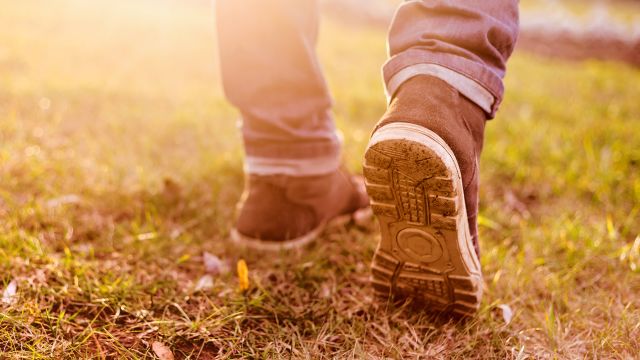Saying you're too heavy to exercise is like saying you're too skinny to eat. Your body needs exercise just as your body needs food. And walking may be one of the best-kept secrets of weight loss. Many people who have succeeded in losing a lot say that walking every day was a key factor.
No matter how overweight you are, you can do something to start the process of losing fat, strengthening your bones, and relieving your joints of the load that they're carrying. Just follow our six steps to the perfect walking program and you'll be walking off the fat in no time.
6 Steps to the Perfect Walking Program
1. Think: Every day, no excuses
You must make walking a priority every day. And that's walking—not gardening or house cleaning or hitting golf balls. You can do those things, too, but they can't take the place of your daily walk. Use a calendar to keep track of your walks.
2. Think: Small
Walk just a few minutes a day if that's all you can do right now. Then, increase by 1 or 2 minutes every few days. And go slowly at first. You'll still burn the same number of calories as a smaller person walking more quickly, because your body is carrying a bigger load. And walking slowly can reduce stress on the knees by up to 25%. Once you've built up your stamina, aim for 30 minutes every day (you can break it into three 10-minute walks if you like).
3. Think: Warm-up
Warm-ups prepare your body, physically and psychologically, for the upcoming workout. For walking workouts, a slower walk is the warm-up. So start by walking slowly for several minutes. You will know you are ready to go at a faster clip when you start to feel a little warmer and your heart beats a little faster.
4. Think: Pleasant
For most people, strenuous exercise is no fun. Odds are, if you work out so hard that you don't enjoy it, you'll probably stop. So cut yourself some slack, and keep the pace enjoyable. This will save you from overuse injuries, too. If you feel pain, do your body a favor: Listen, and let up.
5. Think: Crank it up (gradually)
Once you've been walking for a while, and you're feeling good and enjoying more energy and stamina, increase your activity: Go faster or farther. But do not increase it more than 10% in any week, no matter how good you feel.
6. Think: Stretch, stretch, stretch
Great health without stretching is like trying to look good without combing your hair—it ain't gonna happen. Set aside 2 or 3 minutes to stretch when you're done walking. Stretching the muscles you just used allows them to be ready for the next time you want to use them. It's not clear if stretching decreases soreness afterward, but it definitely improves and maintains joint range of motion. Here are some stretching basics:
- Move slowly into the stretch position until you feel a gentle (not painful) pulling sensation.
- Hold the stretch for 10 to 30 seconds without bouncing.
- Repeat each stretch at least two or three times. (If you cut corners and only do it once, hold the stretch for at least 20 seconds.)
- Do one stretch for each muscle group you exercise.
- Stop immediately if you feel pain in a joint when performing a stretch. Stretches should be felt in the muscles, not the joints.
More walking wonders
Walk not only for the physical effects but also for the psychological boost. Remember where self-esteem comes from: the ability to overcome obstacles and achieve goals. Walking accomplishes both! And if you learn to enjoy your stretching sessions and indulge in them, stretching may become as much of a benefit to your body and psyche as walking.






